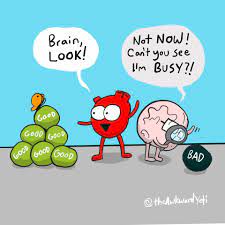
Negativity bias is a psychological phenomenon that describes our brain’s tendency to give more weight to negative experiences, emotions, and information than to positive ones. It’s a deep-rooted survival mechanism that helped our ancestors stay alert to potential threats in their environment. While this bias served us well in the past, it can often hinder our well-being and decision-making in the modern world. In this article, we will explore why negativity bias is so strong and what we can do to mitigate its effects.
The Evolutionary Roots
Negativity bias can be traced back to our evolutionary history. Early humans who were more attuned to potential dangers were more likely to survive and pass on their genes. Consequently, our brains became wired to prioritize negative information to protect us from harm. This innate bias still operates today, even though most of us don’t face life-threatening situations on a daily basis.
Why Negativity Bias Persists
- Emotional Impact: Negative events and emotions tend to have a stronger and more lasting impact on us than positive ones. We remember criticisms longer than compliments, and traumatic experiences can haunt us for years. This emotional intensity engrains negativity bias in our psyche.
- Survival Instinct: Our brains are hardwired to focus on potential threats. This means we pay more attention to negative information, which could indicate danger, and often overlook positive information that may not directly impact our survival.
- Confirmation Bias: Negativity bias is reinforced by confirmation bias, where we seek out and give more credence to information that aligns with our pre-existing negative beliefs. This creates a cycle that can be hard to break.
Overcoming Negativity Bias
- Awareness: Recognizing that negativity bias exists is the first step in overcoming it. By acknowledging this bias, we can consciously work to balance our perspective.
- Practice Gratitude: Cultivating gratitude helps counteract negativity bias. Regularly reflecting on the positive aspects of our lives can shift our focus away from negative thoughts.
- Mindfulness Meditation: Mindfulness practices encourage living in the present moment without judgment. This can reduce the impact of negative emotions and thoughts, allowing us to see them more objectively.
- Challenge Negative Thoughts: When you catch yourself dwelling on negative thoughts, challenge them. Ask yourself if they are rational or if you’re falling victim to bias.
- Limit Exposure to Negative News: While staying informed is important, constant exposure to negative news can amplify negativity bias. Limit your news consumption and focus on balanced reporting.
- Positive Psychology: Explore the field of positive psychology, which emphasizes strengths, well-being, and happiness. Learning about positive psychology can help reframe your perspective.
- Seek Support: Share your thoughts and feelings with trusted friends or a therapist. Sometimes, talking about negative experiences can help alleviate their emotional impact.
Negativity bias is a powerful cognitive mechanism rooted deeply in our evolutionary past. While it once served as a crucial survival tool, it can now hinder our happiness and well-being in a world vastly different from our ancestors’. By being aware of negativity bias and actively working to counteract it through practices like gratitude, mindfulness, and positive psychology, we can find a healthier balance in our perception of the world, ultimately leading to a more positive and fulfilling life.
